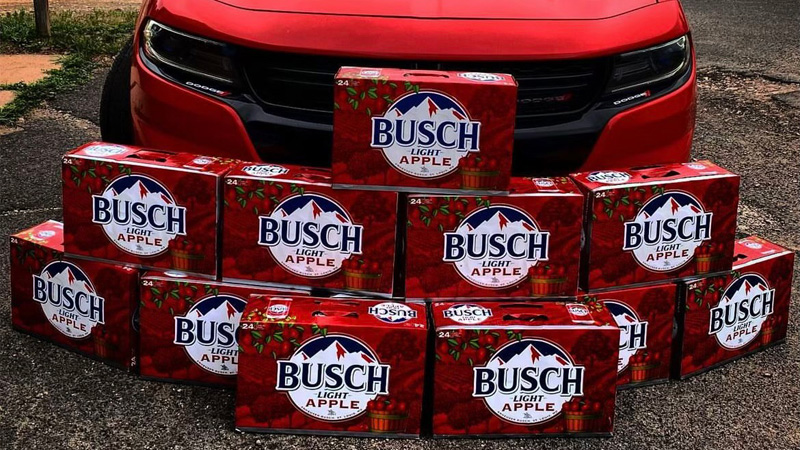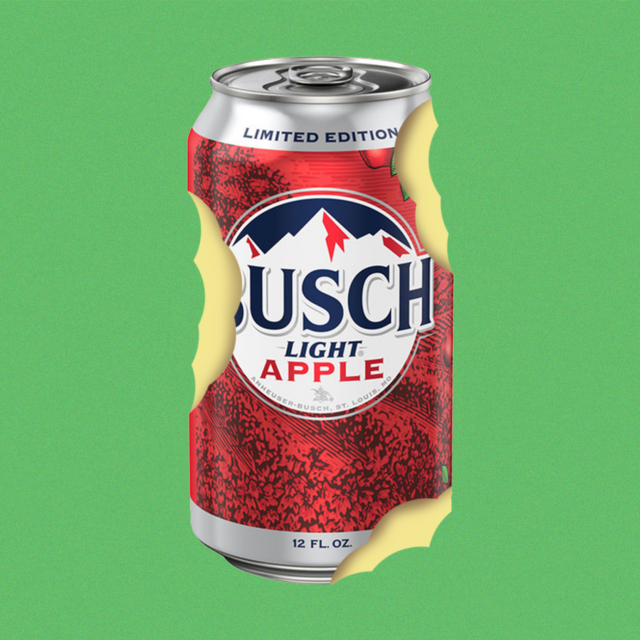Every construction project requires a carrot dangling at the end of the measuring stick. Earlier this year, as Keith Wedeking began building a garage at his house in Cedar Falls, Iowa, he resolved to drink a rare beer upon completing the project. Instead of an imperial stout or lambic of great vintage, Wedeking had squirreled away four expired cans of Busch Light Apple, a flavored lager that was discontinued in 2022.
“They’re for special occasions,” says Wedeking, who works for a cabinet manufacturer. “I stockpiled it just so I would have it.”
Hoarding is familiar behavior in beverage alcohol, from loading car trunks with Tree House IPAs or stocking cellars with bourbon from W.L. Weller. Quality and scarcity, either real or manufactured, can usually explain the accumulation, often accompanied by not-so-humble brags on social media.
Busch Light Apple was neither rare nor expensive. Anheuser-Busch released the summer seasonal in 2020, and customers could stroll into a gas station or supermarket and snag a 30-pack for $22 or so. The fruity spinoff found a rabid fanbase that stopped at nothing to get cold cans in warm hands, starting a Facebook group to find the beer and “even chasing beer trucks to get a taste,” Krystyn Stowe, the head of marketing for Busch Family and Natural Family at Anheuser-Busch, writes in an email.
In summer of 2021, Busch Light Apple, a.k.a. Bapple, sold more than 1 million cases in less than nine weeks, leading Anheuser-Busch to release it nationwide the following year. The move “greatly expanded the beer’s fandom,” Stowe writes, as well as the disappointment when the beer was scrapped.
Forlorn fans tried to recreate Busch Light Apple, turning to homebrew clone recipes, mixing Busch with Redd’s Hard Apple, and even pouring Snapple Apple into a can of Keystone Light like some all-American riff on the Spaghett. Bars infused Busch Light with cinnamon and fresh apples. Someone even started a Change.org petition about turning Busch Light Apple into a year-round release.
“The happiness and memories that Busch Light Apple has made are unparalleled and waiting to have an impact on all of our lives once more,” reads the petition, which has been signed by more than 1,000 people.
Some people are just not ready to let go of the Bapple of their eyes.
Apple Becomes Busch’s First Flavor Extension
Releasing a flavored extension of a beloved brand is smart business in the beer industry. Consider Bud Light, sold in lime and orange, plus hard seltzers tasting of lemonade, sangria, and raspberry iced tea. Anehuser-Busch first produced Busch in 1955, when it was known as Busch Bavarian, and the brand adhered to its beer-flavored roots as it expanded with Light (1979), NA (1994), and the boozier Ice (1996).
In particular, Busch Light has been on a sales bender across the Midwest and South, becoming the top-selling beer in nine states, including Ohio, Kansas, and Iowa. “Our roots are grounded in America’s heartland,” Stowe writes of the brand’s outdoorsy ethos, leaning into collaborations with John Deere and camo cans suited for hunting season. (Pair that beer with official Busch camo gear!) Apples were an easy tip of the tractor hat to the brand’s fanbase.

Limited-edition drops are a well-trod tactic for generating product excitement. For the Busch Light Apple release, “Busch Guy” (actor Gerald Downey) parodied Steve Jobs in an Apple-like unveiling event, touting the beer’s “universal taste compatibility.”
If I were a bettor, I would’ve laid bucks on odds that Busch Light Apple would last one year, tops. But the product quickly found a following, especially among folks who might not gravitate to Busch Light.
Nate Ethen, who lives about one hour north of Minneapolis, usually favored mixed drinks. “I’m not snobby about beer, but I just didn’t like the flavor of a lot of them,” says Ethen, who runs a group home for people with mental and physical disabilities. Busch Light Apple, though, with its fruity, not-too-sugary flavor, appealed to Ethen, who brought it to BBQs and social gatherings. “I liked having it on hand,” he says.
Busch Light Apple’s bulk size and relatively low cost also made it an easy sell. Unlike more expensive flavored malt beverages, or craft beer, “the taste at that price point was unbelievable,” says Dominick Rossi, who reviews “trash” beer on Instagram and first tried Busch Light Apple in 2021. “It tasted like straight apple cider that wasn’t too sweet.”
Drinkers could also crush lots and lots of Busch Light Apple. While in college, Rossi played 78 Cup, an especially destructive version of beer pong with 78 cups on each side, with Busch Light Apple. “Typically halfway through a 78 game, people start complaining about the taste of whatever cheap beer is in the cups,” Rossi says. “Those might have been the only 78 games I’ve ever played where people wanted to drink full beers.”
Discontinuation Leads to Stockpiling
The beer business is simple at its core. If a brand’s sales accelerate, a brewery should produce more beer to meet demand. Busch Light Apple sold five times the volume in its third year of production versus its first year, but Anheuser-Busch still composted the beer. “All good things must come to an end, so we were happy to go out on a high note,” Stowe writes.
“I saw people looking for it everywhere. I just thought, ‘Well, if there’s someone out there who really wants some, I can lighten my load a little bit.’”
Big Bapple fans filled their cars, trucks, vans, and Christmas trees with 30-packs, sometimes as many as 42, nursing their steadily dwindling and aging stock. (Behold, a refined tasting of vintage Busch Light Apple.)
“I was shocked,” Ethen says. He’d purchased about 14 cases, which was easy enough. But what does one do with all that apple beer? At the time, Ethen had a spare bedroom with no bed frame, so “I started stacking them up and basically made a bed frame out of the cases,” he says. “And that worked until I started diving into the stash and then, obviously, got a real bed frame.”
The market for expired fruit lager is more robust than you might imagine. Peruse Reddit and you’ll find desperate Busch Light Apple drinkers looking for their fruity fix. “I’m willing to go to whatever extremes have to be done,” one person wrote.
A Des Moines, Iowa, commenter recently tried finding Busch Light Apple as a Valentine’s Day gift for her boyfriend. “I know it’s discontinued, so [I] will pay whatever the market price is,” mentallyexhausted01 wrote, adding that she “can drive hours if needed.” (Perhaps a Busch Guy-officiated wedding is in their future.)
“The Peach was too sugary, and you could taste the artificialness that just wasn’t there with Bapple.”
Earlier this year, after a health scare led Ethen to drink less, he decided to sell two cases for $60 apiece. “I saw people looking for it everywhere,” he says. “I just thought, ‘Well, if there’s someone out there who really wants some, I can lighten my load a little bit.’”
On the Busch Light Apple Facebook group, he found someone who wanted Bapple for his chili recipe. The other buyer wanted to drink the beer. “He was like, ‘I just love this s*it. I’m probably going to drink half of it tonight,’” Ethen says.
Selling the Bapple left Ethen with mixed emotions. After saving the beer for the better part of two years, “it was sort of melancholy letting it go,” he says.
Anheuser-Busch has no current plans to revive Busch Light Apple, which was more or less a proof of concept. “Busch Light Apple helped pave the way for Busch Light Peach,” Stowe wrote of the replacement, which debuted in 2023.
In its first year, sales of Busch Light Peach (might we suggest a “Beach” nickname instead of “Bleach”) outperformed Apple, leading Anheuser-Busch to take the brand national this summer with accompanying TV commercials. Not every Bapple fan is on board.
“The Peach was too sugary, and you could taste the artificialness that just wasn’t there with Bapple,” Rossi says.
Iowa’s Wedeking bought two 30-packs when they were on sale, but “I wish I would have bought two cans,” he says. “It tasted like you put a peach Jolly Rancher in a Busch Light.”
Wedeking isn’t looking to fill the apple-shaped void in his beer fridge. There’s no Sisyphean mission to find replacements, a task that will grow tougher with each ensuing recycling day. Outside of the rare Blue Moon, he’s back to stocking his fridge with plenty of Rolling Rock and Busch Light.
But first, there’s a celebratory beer to drink. “The painters finished [the garage] last week, so I’ve been meaning to sit out there and drink a Busch Light Apple,” he says.
